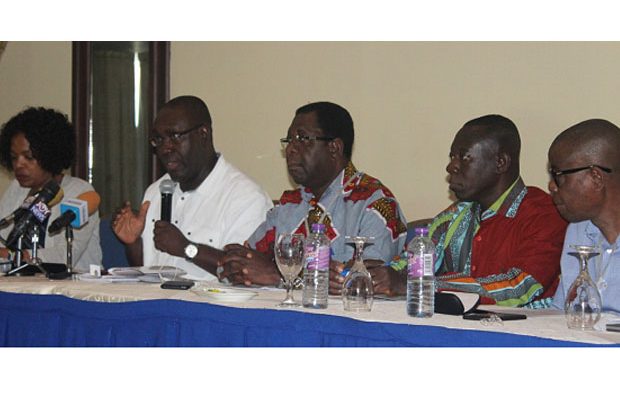Dr Yaw Baah (second from left) with other African Union leaders at the meeting.
The conference of trade union leaders has called on African leaders to be more proactive in the implementation of the African Continental Free Trade Area (AfCFTA) in order to safeguard African markets for African products.
The establishment of the free trade area has the potential to increase intra-African trade and investment, with positive implications for economic growth and employment creation; however, the AfCFTA carries risks for Africa.
“There is a risk of capture of the African market by the advanced countries especially the European Union, which already has trade agreements with several African Countries,” according to a communiqué issued at the end of the 4th African Trade Union Co-operation meeting in Accra.
The four-day conference themed, “Promoting and Protecting the Rights of Workers of Africa”, had in attendance over 70 trade union leaders from TUC Ghana, Nigeria Labour Congress (NLC) and the Congress of South African Trade Unions (COSATU), as well as the international trade union federation, Africa Regional Organization (TUC-Africa) and the Organization of African Trades Union Unity (OATUU).
Reading the communiqué, Dr Yaw Baah, Secretary General, Trades Union Congress, Ghana, said the conference was ready to work with African governments to ensure that the AfCFTA serves Africans.
He said the conference observed with concern the lack of decent employment that has turned the employment market in Africa into employers markets and allowing particularly foreign investors to abuse the rights of workers.
Dr Baah, therefore, indicated that the conference had resolved to embark on a sustained campaign with the aim of changing the nature of economic policy in areas of macroeconomics, trade, labour market and wage, investment and industrialization, among others.
The General Secretary of the TUC, Ghana, further stressed the need to end gender-based discrimination at the workplace. He encouraged trade unions to work towards the ratification of the adopted ILO Convention (C190) and its accompanying Recommendation (R206) and ensure their tenets are domesticated in natural laws and trade union policies and programmes.
By Jamila Akweley Okertchiri


